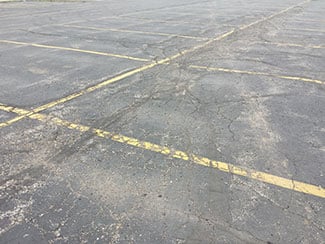 The appearance of your driveway creates the first impression for your home or place of business. As the focal point for passersby’s and visitors, an attractive driveway with curb appeal adds value to your investment. When planning for driveway construction or repair, it is important to pay attention to several factors that relate to both design and function. Here are 6 key considerations when beginning any driveway repair or construction project.
The appearance of your driveway creates the first impression for your home or place of business. As the focal point for passersby’s and visitors, an attractive driveway with curb appeal adds value to your investment. When planning for driveway construction or repair, it is important to pay attention to several factors that relate to both design and function. Here are 6 key considerations when beginning any driveway repair or construction project.
1. Choosing an Asphalt Paving and Repair Contractor
Hiring a professional contractor is essential in any driveway repair, repaving or construction process. Door-to-door contractors with ‘extra asphalt’ or sealant that offer you a good price on the spot could very well be scammers. However, using a reputable asphalt company with strict specifications, procedures, and installation techniques ensures top-quality results.
Here are a few considerations when hiring an asphalt paving and repair contractor.
- Obtain more than one quote for your driveway repaving, installation or repair. The most-trustworthy companies typically offer free quotes for driveway projects.
- Take the time to visit previous installation and work sites by companies under consideration, and call previous client references to validate.
- Choose a contractor with a solid reputation in your community. Asking neighbors and friends is an easy way to find a reliable driveway construction company. Insist that any agreements pertaining to services, guarantees, and quotes are in writing.
- Verify that the company carries the proper liability insurance coverage in case of an accident or injury during the project to prevent being held liable yourself.
2. Placement of Driveway Construction
Another benefit of working with reputable asphalt professionals is that they can help preserve and enhance the natural aesthetics of your landscape. Trees, rocks, and existing landscaping can be maintained, while your driveway can be strategically designed to conform to the existing terrain. Keeping the driveway some distance from deep-rooted trees and shrubs will further help prevent future penetrations and cracks in the asphalt as the two compete for space.
3. Width & Thickness of Asphalt Paving
The Wisconsin Department of Transportation issues very specific guidelines pertaining to acceptable width and thickness levels of asphalt pavement. Within the industry, a single car driveway is recommended to be at least 8 feet wide, with 10 feet being preferable. Two-car driveways should be a minimum of 12 feet, but 20 is best for opening car doors comfortably.
Pavement thickness will vary depending on the subgrade conditions and materials utilized, so the experts will make a recommendation during your quote. Before signing any contract, be sure that any asphalt thickness levels agreed to are of minimum compacted thicknesses, as this could change or vary during the course of driveway paving and repair.
4. Subgrade Surface Preparation
The subgrade is a vital component of any driveway installation. It serves as the platform for your asphalt. Beyond the proper selection of materials, your contractor must further compact, grade, and treat the subgrade with a soil sterilizer to prevent future vegetation growth. Contractors will test the entire driveway area for any ‘soft spots’ and will resolve them before continuing with the asphalt overlay procedure.
5. Proper Driveway Drainage
Driveways with poor drainage have a shorter lifespan and require more frequent maintenance and repairs. Standing water compromises the materials and integrity of asphalt installations. Over time these permeations will result in cracks and holes that require driveway repairs far too soon.
Even on flat areas a driveway requires at least a two percent slope and a crown of at least a quarter-inch per foot for proper drainage. Considerations for drainage include evaluating the potential runoff from any surrounding structure’s downspouts, walkways and patios. Special considerations may include the installation of pipe cross drains beneath the driveway to redirect the water.
6. Why Sealing Pavement Matters
Sealcoating asphalt is recommended within the first year of installation and is essential to maintaining an attractive driveway for years to come. Sealcoating is also recommended after most driveway repairs and driveway repaving processes. The benefits of asphalt sealcoating are numerous and include:- Sealcoats are dark and give the driveway a brand new look even if it’s only been resealed
- Sealcoat reduces exposure to UV rays and oxidation
- Helps prevents weather damage – even standing water and snow
- Offers a level of oil and gas resistance, making the asphalt easier to clean
Flexibility of the asphalt is increased with periodic sealcoating and prevents cracks. If your home or business already has an asphalt driveway in place and it shows signs of wear and tear, sealcoating, overlaying or completely removing and replacing may be in order. Only reputable, driveway engineer experts who will evaluate subgrade surface and drainage and execute construction or repair with a focus on quality and detail should complete these processes. All driveways age and deteriorate and become a use and safety hazard. The goal with any driveway should be to maximize the life expectancy as much as possible before having to completely remove and replace it. This requires a solid plan with frequent maintenance every 3 to 5 years!
Are you considering having your parking lot or driveway repaired or repaved? Contact Wolf Paving for more information or request a quote. Let us help you find the right asphalt solution for your project!





